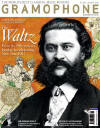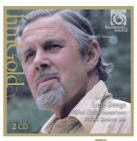Texte paru dans: / Appeared in:
*

GRAMOPHONE (01/2013)
Pour s'abonner /
Subscription information
Harmonia Mundi
HMG 50244/45

3149020024416
Alfred Deller
Richard Wigmore pays tribute to the pioneering singer who revived the
countertenor voice
When Michael Tippett first heard Alfred Deller singing Purcell’s ‘Music for a while’ in Canterbury Cathedral in 1942 he felt ‘the centuries roll back’. Here was a type of voice long thought extinct: a full, pure, flexible male alto, light years away from the pallid and/or squawky altos who usually inhabited cathedral choir stalls. Tippett, then at the forefront of the Purcell revival, immediately sensed that Deller’s was exactly the kind of voice the composer envisaged. Having at last found an alto to do justice to Purcell’s grandly ornate lines, he programmed the Ode Hail! bright Cecilia for Deller’s professional concert debut, on New Year’s Eve 1944. At the relatively advanced age of 32 the Canterbury lay clerk was on his way.
‘England’s very own voice’ was how one obituary described Deller. The accolade was true in the sense that he was responsible almost single-handedly for restoring the male alto, or countertenor (the terms are interchangeable) voice to the status it had enjoyed three and four centuries earlier. By reviving the characteristically English art of falsetto singing, Deller also played a crucial role in the rediscovery of reams of Elizabethan and Jacobean music, and of Purcell, the composer closest to his heart. His successors, from Paul Esswood and James Bowman to Michael Chance and Andreas Scholl, have all acknowledged their debt to Deller. Esswood cites not only the beauty of his voice but ‘his totally new concept of interpreting a phrase’: with a freedom and fantasy that took many early listeners aback.
Deller was rare among great singers in being completely selftaught. He was born in Margate on May 31, 1912, by ironic coincidence within weeks of the birth of contralto Kathleen Ferrier, the last great representative of an English species which the countertenor revival all but killed off. Deller’s father was an army sergeant turned PE instructor who ran his large family rather like a parade ground. But on his own admission Alfred did acquire two vital things from his father: an imposing physique, with a broad chest and capacious lungs; and a strong sense of rhythm, learnt from watching his father take gym classes.
Deller left school at 15 for a career in the furniture trade. When he moved round the Kent coast to Hastings in 1932, he joined the then famous choir of Christ Church, St Leonard’s, and fell in love with his employer’s daughter, Peggy Lowe. Despite her mother’s opposition to a man who produced strange and suspect falsetto sounds (even in his years of his fame he suffered from prejudice and furtive audience sniggers), the couple married in 1937. Two years later he became a lay clerk in Canterbury; and as a lifelong pacifist he spent the war years combining singing duties with work on a Quaker farm.
After his ‘discovery’ by Tippett, Deller sang in Purcell’s Come, ye Sons of Art for the inaugural concert of the BBC Third Programme in 1946. Always happy in the choir stalls (he remained a lay clerk into his fifties), he moved from Canterbury to St Paul’s Cathedral the following year, and in 1950 founded the Deller Consort. From his debut 78 disc of Purcell, he recorded prolifically: lute songs and English folksongs with Desmond Dupré (and, later, Robert Spencer), Purcell songs and Odes, Bach cantatas with Leonhardt (no one has floated the opening lullaby of No 170, ‘Vergnügte Ruh’ more exquisitely), madrigals and a cappella sacred music with the Deller Consort.
In English folksong Deller revealed the wit and timing of a born storyteller. Yet unlike most of his successors, he sang little opera. His was an essentially intimate, reflective art; and his one major operatic appearance, as Oberon in the 1960 Aldeburgh premiere of Britten’s A Midsummer Night’s Dream, was a mixed success. Critics praised his singing while going to town on the deficiencies of his acting. For the planned Covent Garden performances Solti cast American countertenor Russell Oberlin. Deller, always prone to insecurity and depression, was devastated – though in partial compensation Britten did insist on Deller for his 1966 recording of the opera.
By the late 1960s Deller’s voice had grown darker, deeper and a shade less pliable than before; but his gift for penetrating the essence of a song remained undiminished: say, in the Dowland lute songs he recorded with Robert Spencer in 1977. By this time he was suffering from angina, yet barely eased up. When he died of a heart attack in Bologna on July 16, 1979, the news was announced to a clip of ‘Music for a while’. Obituaries paid homage not only to his artistry, his gift for burning a phrase into the memory, but also to his part in reviving a lost tradition. Perhaps the most moving tribute came, aptly, from Michael Tippett. Recalling that TV clip of ‘Music for a while’, he wrote: ‘A poignant emotion indeed, to be comforted in the moment of grief by the man himself, though already passed out of life. The voice, as always, had its own inviolable purity. It sounded so gentle, so alone, as to be almost frail. But a frailty, certainly a purity, that is also a strength; some quintessence, surely, of our great and mutual art.’
Cliquez l'un ou l'autre
bouton pour découvrir bien d'autres critiques de CD
Click either button for many other reviews


